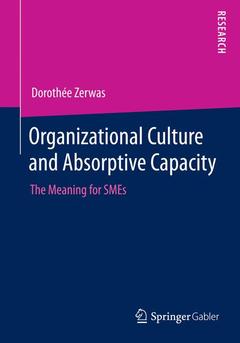Description
Organizational Culture and Absorptive Capacity, 2014
The Meaning for SMEs
Author: Zerwas Dorothée
Language: English
Subjects for Organizational Culture and Absorptive Capacity:
Publication date: 04-2014
279 p. · 14.8x21 cm · Paperback
279 p. · 14.8x21 cm · Paperback
Description
/li>Contents
/li>Biography
/li>Comment
/li>
Firms are increasingly collaborating with outside partners to access external knowledge that will enable them to successfully innovate and remain competitive in the marketplace. To apply external knowledge, they must have a distinctive capacity to absorb knowledge. One of the main influencing factors for absorptive capacity is a knowledge-friendly organizational culture, because the knowledge absorbing behavior of individuals can be better coordinated through implicit values and norms than through structural coordination instruments. When focusing on an organization?s overall behavior, it is important to investigate in detail how a knowledge-friendly organizational culture influences absorptive capacity. Therefore, the author analysis the relationship between organizational culture and absorptive capacity and shows how a knowledge-friendly organizational culture should be designed to support the absorption of external knowledge in SMEs.
The Impact, Meaning and Challenges of External Knowledge Absorption.- The Conceptual Principles of Absorptive Capacity and Organizational Culture.- A Model of External Knowledge Absorption.- Implications for a Knowledge-Friendly Culture.
Dorothée Zerwas is a post-doctoral researcher and lecturer at the University of Koblenz-Landau, Computer Science Faculty, Institute for Management.
Publication in the field of economic science Includes supplementary material: sn.pub/extras
© 2024 LAVOISIER S.A.S.




